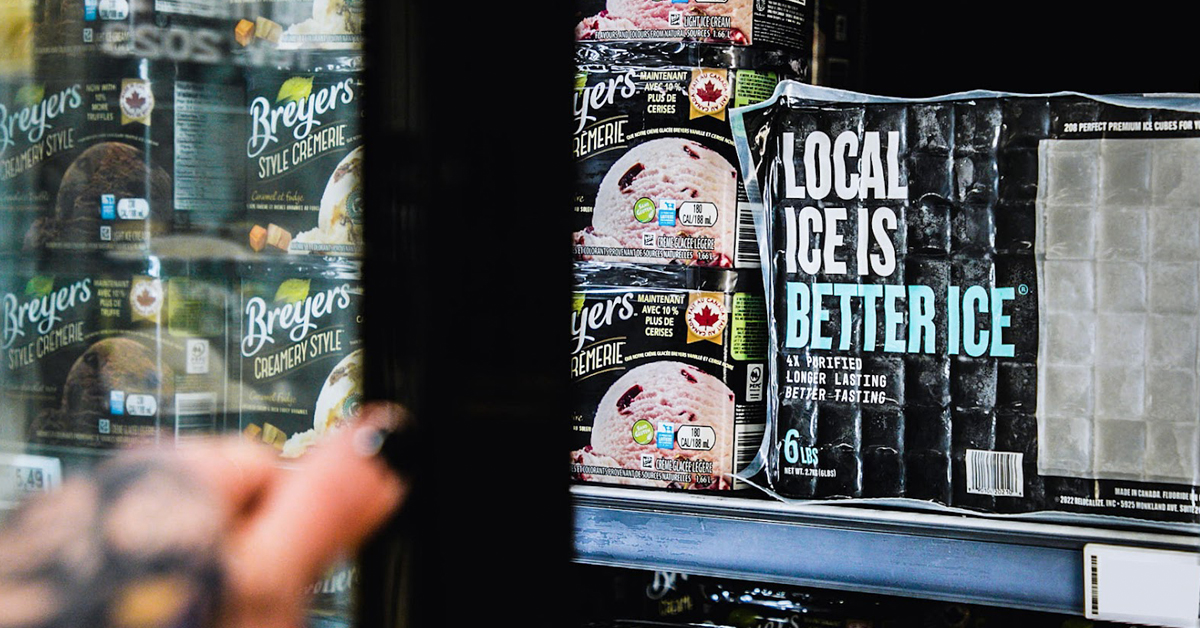Montreal-based manufacturing and tech company Relocalize has the capacity to operate over 100 fully autonomous micro-manufacturing facilities within the next three years, said co-founder and CEO D. Wayne McIntyre.
The company claims its hyper-localized production model can reduce a food or beverage product’s carbon output by upwards of 90% and eliminate shipping and logistics costs, all while keeping the price for consumers at parity, or lower, than the current industry standard. The company and concept has been in the works for nearly ten years and McIntyre himself brings decades of expertise in tech commercialization, including serving as chief commercial officer of DIREXYON technologies, to the business.
The micro-factories or RELOs, currently equipped to produce packaged ice, already have the capability to shell out various types of “simple input” products, like beverages and shelf-stable juices made mostly from water and concentrates.
“When we look at products made [mostly] of water like beverages or packaged ice, the cost of logistics is a huge part of the cost of goods sold,” said McIntyre. “[With our model], those costs basically go away.”
Relocalize’s first product, known as Better Ice, is packaged in rectangular 6 lb. food safe vacuum packaging.
“It just looks and feels like a premium food product,” said McIntyre.
Relocalize’s model works through retail partnerships where it co-locates the “less than 1,200 sq. ft.” factories at retail warehouses, fulfillment or distribution centers. In March, the company began its first pilot ice operation with Southeastern Grocers in Florida. Through that agreement Relocalize acts like Southeastern’s ice co-packer: the retailer agrees to a minimum order quantity and Relocalize retains ownership of the facility, which is completely operated by its remote team from a distance.
“We can sign a contract, drop one of these things into place and two weeks later, be making product without having to go through any major change management exercises, or any big transformation,” McIntyre explained.
According to McIntyre, the majority of the facility’s operations (about 75%) is executed by Relocalize’s proprietary, standardized production process which encompasses food safety aspects, packaging, palletizing, the AI to control systems and robotics. He said the approximate remaining 25% of that tech is product specific, and has to be adapted to achieve various product types.
The technology was inspired by production processes of both the automotive industry’s as well as the tech manufacturing industry, McIntyre said; Relocalize merged the two to bring “next level” automation to food. He highlighted that the facilities are equipped to manufacture products end-to-end and are designed to fit within existing warehousing and distribution operations, circumventing the need for any special equipment or additional labor.
For roughly the next five years, Relocalize has its sights set on upending the $8.5 billion packaged ice industry, which McIntyre emphasized is currently controlled by three regional monopolies. While the company has the capabilities and business model designed to expand to new product types, it wants to maintain a focus within its own business and not overextend itself since the facilities are owned and operated by Relocalize itself, he explained. Toward the end of that five-year timeline, McIntyre believes the company may begin expanding to new product types.
“We see ourselves as a billion dollar-north revenue company,” said McIntyre. “And we see ourselves as a market leader for packaged ice… I think our retail partners will really tell us ‘here’s where we want you to go next,’ and our goal is really to serve our retail partners and develop what they want, help them take control of their supply chain, and use their own infrastructure to do it.”
The vertical farming industry has followed a similar playbook to bring hyper-local produce to consumers: Square Roots has co-located growing facilities with select UNFI distribution centers while Freight Farms sells infrastructure for shipping container-sized vertical farms. McIntyre said Relocalize is looking to take those efforts a step further into the food industry.
A key component to Relocalize’s value proposition is reducing or eliminating the need for cold storage warehousing and additional distribution touch points. Since products can be manufactured “as needed” they can also be distributed as needed and on demand to local retail outlets.
McIntyre said Relocalize is “overbuilding” RELOs so it can deploy them as necessary to retail partners nationwide over the next three years. In October, the company announced the initial closing of $2.5 million, in a $3.5 million seed round, led by i4 Capital and Waterpoint Lane, to fuel those expansion efforts. In addition to its seed round investors, the company has secured interest from “C-level retail and food executives,” he noted.
“When [we] talk to a distribution center manager and say, ‘I’d like to have some outside space or some rooftop space or some unused space at your DC and in exchange I’m going to give you back those 20 truckloads of cold storage that you have in July for the ice market’ – their eyes light up. As soon as you build cold storage, that space is oversubscribed and so, if you can give them back that space – that’s a really powerful incentive for a retailer to partner [with us] on top of all the other reasons.”

